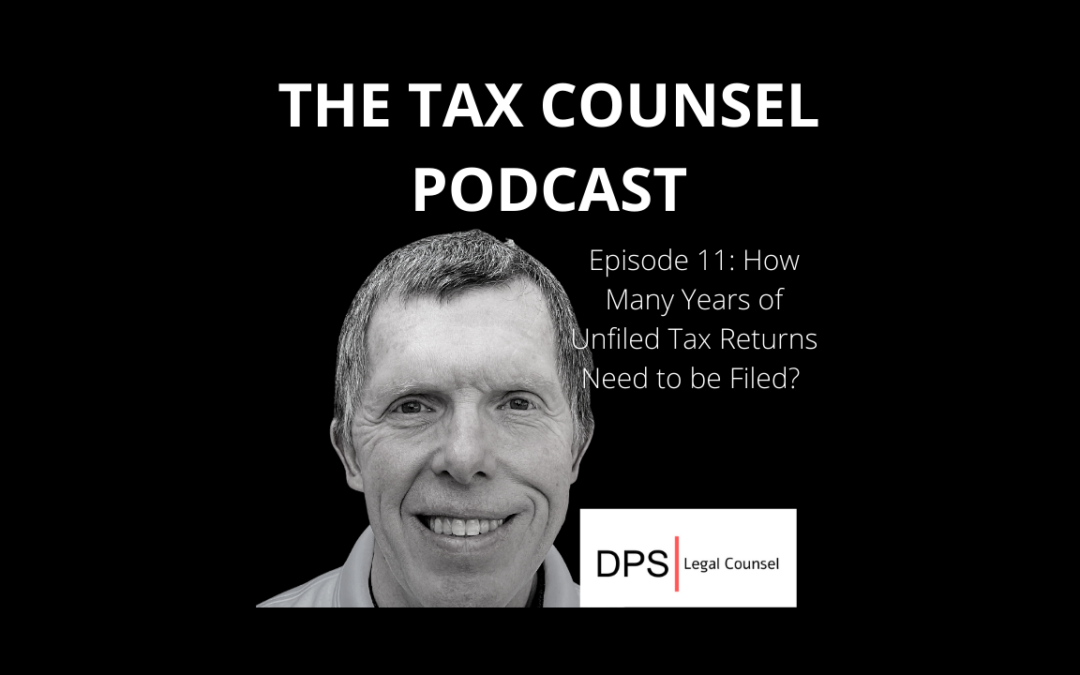Hi, this is Dan Smith of DPS Legal Counsel. Welcome to today’s podcast on The Tax Counsel Podcast where I discuss issues involving taxes and how they impact the operation of small businesses and self-employed individuals.
Today, I want to talk about non-filed tax returns. It sometimes happens that individuals and businesses fail to file the required tax returns when they are due. Non-filed tax returns can be a big problem for both individuals and small businesses. There are a number of reasons why all individuals and all businesses should always file their tax returns on time even if they are unable to pay the tax shown on the return.
First of all, the statute of limitations on the Internal Revenue Service’s ability to assess tax doesn’t begin to run until a tax return is filed. Typically, the IRS has only three years within which to assess additional taxes that might be owed when a tax return is filed.
If there is an audit or a review of a tax return and the Internal Revenue Service believes that more tax should be paid based on the situation for the taxpayer, they typically have only three years from the time the return is filed in order to assess that additional tax.
Now there are always exceptions to the rule with law, and that holds especially true with tax law.
For example, if there is a substantial understatement of the tax owed and in certain other cases, that statute of limitations on assessment is not three years, but the period is then lengthened to six years. And if fraud is involved, there is no statute of limitations on assessment. But typically there is a three-year period on assessment. And so that doesn’t begin to run until a tax return is filed.
So that’s one reason to always file a tax return, even if you are unable to pay the tax shown on the return.
Another reason is there is typically a 10-year statute of limitations on collection, but again, you need to be filing tax returns.
Finally, there are potential criminal penalties involved for willful failure to file tax returns. Now it’s not typically the case that the Internal Revenue Service pursues criminal charges against non-filers–certainly not in all cases.
However, if someone is not filing tax returns and there are significant amounts that would otherwise be paid or be owing and depending on the situation, if is the taxpayer a high level person, would this be the kind of person or business that the Internal Revenue Service and the government would like to make an example of to deter other people from failing to file taxes, that could all play into the decision whether or not to pursue criminal charges against the non-filer.
But typically non-filing results in civil issues for the non-filer, more often than criminal charges.
But there are statutes that do make it a criminal offense for willful failure to file tax returns.
Now, let’s say that a business or an individual has failed to file tax returns for a number of years, but wishes to file the returns and get back into compliance with the Internal Revenue Service.
The question often arises how many years of tax returns should that person or that company file in order to get back in the good graces and into compliance with the Internal Revenue Service. There’s no simple answer to that, but I can give some general ground rules or boundaries to that question in order to kind of give a little bit of information that might be helpful generally to someone who is wondering how many years do I need to file in order to get into compliance.
You have to look at it from two perspectives, one, the civil side of things, the exposure for owing money and having a collection and enforcement action brought against you.
That’s one side, the other side is the criminal side.
How, how long does the Internal Revenue Service have to bring a criminal charge for the willful non-filing of a tax return?
So let’s look at the criminal side first under section 6531 of the Internal Revenue Code, the Internal Revenue service or the government essentially has six years after the due date of a return in order to bring criminal charges against someone, either a person or business for willful non-filing of a tax return, six years after the due date of the return.
So in order to bring a non-filer into a situation that would eliminate the possibility of a criminal charge being brought against that person or that company, that person or company would need to make sure that all tax returns that would have been due within the past six years are filed. Returns that would have been due more than six years though might pose a civil problem.
And we’ll get to that in a moment.
Though if the returns for the past six years have been filed and no return would have been due six years or less from the time that we’re looking at, then Section 6531 should provide some comfort to that person or that business that a criminal charge at least is not in the offing, because there is a statute of limitations that specifically provides that no charges can be brought for willful non-filing of a tax return, unless the charges are brought six years or less from the due date of the return, which was not filed.
So we’ll start with the premise that you would need to file it. At least the last six years of returns would have to look at the actual dates to see when the due date was for a particular return, but as a rule of thumb, six years, which should be the starting point to make sure that returns have been filed.
Now on the civil side, there is an IRS policy, which is policy 5-133, which has been published in the Internal Revenue Manual at section 1.2 .14.1.18. And this policy of the Internal Revenue Service is similar to the statute that puts a six year timeframe on the statute of limitations for criminal charges. This policy, which would apply to civil enforcement collection of money from a taxpayer is that generally six years of past due returns, six years of non-filing returns that are then filed typically would bring the taxpayer into compliance. Now this is a policy, but it’s not a hard and fast rule. So in certain cases, the Internal Revenue Service might very well require a non-filing taxpayer to get into civil compliance and to avoid enforcement actions, collection of money, to file more than six years of returns.
There are a number of factors that the Internal Revenue Service looks in this instance. One is the prior history of noncompliance by the taxpayer. Also, whether the taxpayer has income from illegal sources, whether there would be an effect on voluntary compliance, if more than six years were required, the anticipated revenue that would flow to the government if more than six years were required. Now I’ll stop here for a second and just comment.
If you have a situation where a non-filer has a large tax liability for an old year, let’s say one that’s eight or nine or 10 years ago. The Internal Revenue Service might very well require that taxpayer file that return as well in order to get in its good graces and not be subject to enforcement actions for non-filing.
Then, lastly, the Service looks at special circumstances. That’s sort of a catch-all where the Service can look at basically anything it wants to in order to determine whether it should go back further than six years.
Going back more than six years does require management approval at the IRS.
So the rule of thumb generally is that six years of filing of non filed returns that are then filed should cover both criminal and civil aspects of a non-filer’s case. Although you have to caveat that statement by saying that it’s possible under certain circumstances, that more than six years of returns would have to be filed.
All right. I hope that helps. If you have any questions, please feel free to let me know and we’ll see you next time.

